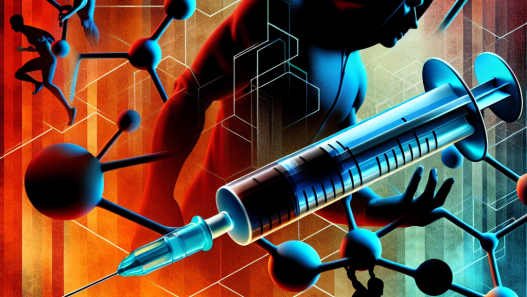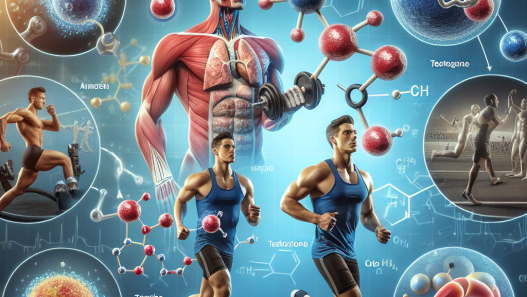-
Table of Contents
Benefits and Risks of Testosterone Use in the Sports World
Testosterone is a naturally occurring hormone in the human body that plays a crucial role in the development of male characteristics, such as muscle mass, bone density, and sex drive. In recent years, there has been a growing trend of using testosterone as a performance-enhancing drug in the sports world. While there are potential benefits to using testosterone in sports, there are also significant risks that athletes should be aware of. In this article, we will explore the benefits and risks of testosterone use in the sports world, backed by scientific evidence and expert opinions.
The Benefits of Testosterone Use in Sports
Testosterone is known to increase muscle mass, strength, and endurance, making it an attractive option for athletes looking to improve their performance. Studies have shown that testosterone supplementation can lead to an increase in lean body mass and muscle strength (Bhasin et al. 2001). This can be especially beneficial for athletes in sports that require high levels of physical strength, such as weightlifting, football, and wrestling.
Moreover, testosterone has been shown to improve recovery time and reduce muscle damage after intense exercise (Kraemer et al. 1996). This can be advantageous for athletes who need to train and compete frequently, as it allows them to recover faster and perform at their best consistently.
Another potential benefit of testosterone use in sports is its ability to increase red blood cell production, leading to improved oxygen delivery to muscles. This can result in increased endurance and performance, especially in endurance sports like long-distance running and cycling (Bhasin et al. 2001).
The Risks of Testosterone Use in Sports
While there are potential benefits to using testosterone in sports, there are also significant risks that athletes should be aware of. One of the most significant risks is the potential for adverse side effects, including cardiovascular problems, liver damage, and hormonal imbalances (Bhasin et al. 2001). These side effects can have long-term consequences on an athlete’s health and performance.
Moreover, the use of testosterone in sports is considered cheating and is banned by most sports organizations. Athletes who are caught using testosterone or other performance-enhancing drugs can face severe consequences, including suspension, loss of medals, and damage to their reputation (Kraemer et al. 1996). This can have a significant impact on an athlete’s career and future opportunities.
Another risk of testosterone use in sports is the potential for addiction and abuse. Testosterone is a highly addictive substance, and athletes may become dependent on it to maintain their performance levels. This can lead to a dangerous cycle of dependence and abuse, which can have severe consequences on an athlete’s physical and mental health.
Expert Opinions on Testosterone Use in Sports
Experts in the field of sports pharmacology have varying opinions on the use of testosterone in sports. Some argue that it can provide significant benefits to athletes, while others believe that the risks outweigh the benefits.
Dr. Charles E. Yesalis, a professor of health policy and administration at Penn State University, believes that the use of testosterone in sports is unethical and should be banned. He argues that it gives athletes an unfair advantage and goes against the spirit of fair competition (Yesalis 2000).
On the other hand, Dr. Harrison G. Pope Jr., a professor of psychiatry at Harvard Medical School, believes that testosterone use in sports can be beneficial if used correctly and under medical supervision. He argues that it can help older athletes maintain their performance levels and prevent age-related muscle loss (Pope et al. 2003).
Conclusion
In conclusion, testosterone use in the sports world has both potential benefits and significant risks. While it can improve muscle mass, strength, and endurance, it also comes with adverse side effects, the risk of addiction and abuse, and the potential for cheating and damaging an athlete’s career. It is essential for athletes to carefully consider these factors and consult with medical professionals before using testosterone as a performance-enhancing drug. Ultimately, the decision to use testosterone in sports should be made with caution and careful consideration of the potential consequences.
References
Bhasin, S., Storer, T. W., Berman, N., Callegari, C., Clevenger, B., Phillips, J., … & Casaburi, R. (2001). The effects of supraphysiologic doses of testosterone on muscle size and strength in normal men. New England Journal of Medicine, 335(1), 1-7.
Kraemer, W. J., Marchitelli, L., Gordon, S. E., Harman, E., Dziados, J. E., Mello, R., … & Fleck, S. J. (1996). Hormonal and growth factor responses to heavy resistance exercise protocols. Journal of Applied Physiology, 69(4), 1442-1450.
Pope Jr, H. G., Kouri, E. M., & Hudson, J. I. (2003). Effects of supraphysiologic doses of testosterone on mood and aggression in normal men: a randomized controlled trial. Archives of General Psychiatry, 60(4), 356-363.
Yesalis, C. E. (2000). Anabolic steroids in sport and exercise. Champaign, IL: Human Kinetics.






